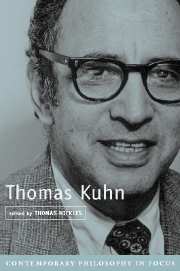Book contents
- Frontmatter
- Contents
- Contributors
- Preface
- Introduction
- 1 Kuhn and Logical Empiricism
- 2 Thomas Kuhn and French Philosophy of Science
- 3 Normal Science and Dogmatism, Paradigms and Progress: Kuhn ‘versus’ Popper and Lakatos
- 4 Kuhn's Philosophy of Scientific Practice
- 5 Thomas Kuhn and the Problem of Social Order in Science
- 6 Normal Science: From Logic to Case-Based and Model-Based Reasoning
- 7 Kuhn, Conceptual Change, and Cognitive Science
- 8 Kuhn on Concepts and Categorization
- 9 Kuhn's World Changes
- 10 Does The Structure of Scientific Revolutions Permit a Feminist Revolution in Science?
- Selected References in English
- Index
- References
3 - Normal Science and Dogmatism, Paradigms and Progress: Kuhn ‘versus’ Popper and Lakatos
Published online by Cambridge University Press: 07 December 2009
- Frontmatter
- Contents
- Contributors
- Preface
- Introduction
- 1 Kuhn and Logical Empiricism
- 2 Thomas Kuhn and French Philosophy of Science
- 3 Normal Science and Dogmatism, Paradigms and Progress: Kuhn ‘versus’ Popper and Lakatos
- 4 Kuhn's Philosophy of Scientific Practice
- 5 Thomas Kuhn and the Problem of Social Order in Science
- 6 Normal Science: From Logic to Case-Based and Model-Based Reasoning
- 7 Kuhn, Conceptual Change, and Cognitive Science
- 8 Kuhn on Concepts and Categorization
- 9 Kuhn's World Changes
- 10 Does The Structure of Scientific Revolutions Permit a Feminist Revolution in Science?
- Selected References in English
- Index
- References
Summary
One sixties' summer, shortly before the ‘Summer of Love’, probably the two most widely influential philosophers of science of the twentieth century – Karl Popper and Thomas Kuhn – met at a conference in ‘swinging London’ to compare and contrast their views on the nature of theory change in science.
The debate was recorded (and extended) in an influential book called Criticism and the Growth of Knowledge Although Kuhn was at pains to begin his paper (1970) by stressing similarities between his own views of scientific development and those of ‘Sir Karl’, and although Kuhn's official line was that the differences between Popper and himself were ‘comparatively secondary’, it soon became clear that those differences were in fact sharp and apparently rather deep. Kuhn claimed, for example, that ‘Sir Karl has characterized the entire scientific enterprise in terms that apply only to its occasional revolutionary parts’ (p. 6). And he suggested that to accept his own account of science was, in effect, ‘to turn Sir Karl's view on its head’ by accepting that ‘it is precisely the abandonment of critical discourse that marks the transition to a science’ (ibid.). Popper responded by, amongst other things, admitting that Kuhn's ‘normal science’ is a real phenomenon and that he had indeed hitherto failed fully to recognise it – but he did so reluctantly in the way that a starstruck lover might be brought to admit that he had hitherto been blind to an imperfection in his inamorata.
- Type
- Chapter
- Information
- Thomas Kuhn , pp. 65 - 100Publisher: Cambridge University PressPrint publication year: 2002
References
- 6
- Cited by

